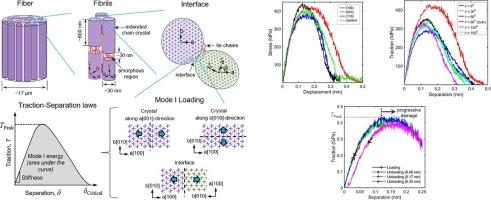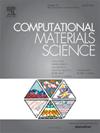Developing Mode I cohesive traction laws for crystalline Ultra-high molecular weight polyethylene interphases using molecular dynamics simulations
IF 3.1
3区 材料科学
Q2 MATERIALS SCIENCE, MULTIDISCIPLINARY
引用次数: 0
Abstract
Ultra-high molecular weight polyethylene fiber with a diameter of 17 µm contains over 100,000 fibrils with diameters ranging from 10 to 100 nm. These fibrils can exhibit various relative rotations around the axial direction, forming interphases between distinct crystal planes. Fiber failure can occur due to defibrillation governed by the adhesion between fibrils. In this study, adhesion is quantified through cohesive traction laws that describe the strength, progressive damage, and energy absorption during fibril separation. We predict Mode I cohesive traction laws for polyethylene (PE) interphases between crystals with various orientations using molecular dynamics (MD) simulations. Results were compared with the stress-displacement response of perfect bulk crystals of similar thickness. Surface effects primarily manifested in the outermost layer of PE chains where molecular structure deviates from the bulk crystal structure resulting in a higher surface energy. This resulted in an interphase thickness equivalent to the thickness of two PE chain layers (1.2 nm). The disturbed crystal structure at the interfaces led to a 32% reduction in peak traction and a 46% reduction in energy absorption compared to the perfect bulk crystal. Additionally, results show that strain rate does not have an influence of the traction laws over the range of 108 s−1 to 1010 s−1. The MD-based traction-separation relations were used to fit parameters for a cohesive zone model. The interphase traction laws predicted in this study can be used as interface properties to bridge length scales in multiscale simulations of defibrillation.

利用分子动力学模拟开发超高分子量聚乙烯结晶相间的 I 型内聚牵引定律
直径为 17 微米的超高分子量聚乙烯纤维含有 10 万多条直径在 10 纳米到 100 纳米之间的纤维。这些纤维可围绕轴向进行各种相对旋转,在不同的晶面之间形成相间。纤维失效的原因可能是纤维之间的粘附力导致的颤动。在本研究中,粘附力通过内聚牵引定律进行量化,该定律描述了纤维分离过程中的强度、渐进损伤和能量吸收。我们利用分子动力学(MD)模拟预测了不同取向晶体间聚乙烯(PE)相间的模式 I 内聚牵引定律。结果与厚度相似的完美块状晶体的应力-位移响应进行了比较。表面效应主要体现在聚乙烯链的最外层,其分子结构偏离了块状晶体结构,导致表面能较高。这导致相间厚度相当于两个聚乙烯链层的厚度(1.2 纳米)。与完美的块状晶体相比,界面上紊乱的晶体结构导致峰值牵引力降低 32%,能量吸收降低 46%。此外,研究结果表明,在 108 s-1 到 1010 s-1 的范围内,应变速率对牵引力规律没有影响。基于 MD 的牵引分离关系被用来拟合内聚区模型的参数。本研究预测的相间牵引力定律可作为界面属性,在多尺度去颤模拟中弥合长度尺度。
本文章由计算机程序翻译,如有差异,请以英文原文为准。
求助全文
约1分钟内获得全文
求助全文
来源期刊

Computational Materials Science
工程技术-材料科学:综合
CiteScore
6.50
自引率
6.10%
发文量
665
审稿时长
26 days
期刊介绍:
The goal of Computational Materials Science is to report on results that provide new or unique insights into, or significantly expand our understanding of, the properties of materials or phenomena associated with their design, synthesis, processing, characterization, and utilization. To be relevant to the journal, the results should be applied or applicable to specific material systems that are discussed within the submission.
 求助内容:
求助内容: 应助结果提醒方式:
应助结果提醒方式:


